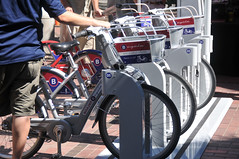It’s been a big month for sharing and two new projects in the works are likely to have a major impact on how Portlanders get around.
Last week, a key Metro committee approved $2 million in federal funding that will help start up the Portland Bike Sharing project. Once fully rolled out, Portland’s bike-sharing system will likely have about 750 bikes with 74 rental kiosks — or about one every five blocks on average. The bikes will be ubiquitous in the downtown core, offering people the option of free short trips aboard a durable and easy-to-ride vehicle.
“By making it easy for me to save money by not owning a car, I’m thinking about the cost of every mile, rather than an all-you-can-eat buffet.”
— Michael Andersen, Portland Afoot
And yesterday, news broke that peer-to-peer car-sharing company Getaround, plans to launch in Portland in the coming weeks. As expected, Getaround is taking advantage of a new Oregon law passed over the summer (not to mention a $1.7 million federal grant). That law, HB 3149, established legal standards and smoothed out insurance issues for personal car-sharing and thus paved the way for Getaround to set up shop.
In case you’re wondering, personal car-sharing is like Zipcar on steroids. It’s based on a simple principle: That people who own cars would rather rent them out for a few bucks than have them sit in their driveway — which cars do over 90% of the time according to experts. Beyond making neighborhood car rentals much easier and more widely available, it’s also very likely that the rise of personal car-sharing will result in fewer vehicle miles traveled per capita in general.
Oregon State Senator Jackie Dingfelder (who sponsored HB 3149) said over the summer that, “Car sharing families drive demonstrably less than car-owning families; and less driving means less congestion and less pollution.”
If bike-sharing and car-sharing succeed to the extent their proponents envision, while our transit network blossoms with new light rail and streetcar options, the incentive to own a car in Portland will be significantly lower than it is today. And, given all the people I know who already live carfree, that’s really saying something.
Michael Andersen, publisher of Portland Afoot, a “newsmagazine on buses, bikes and low-car life,” says anything that discourages car ownership is likely to change the mobility paradigm. “By making it easy for me to save money by not owning a car, I’m thinking about the cost of every mile, rather than an all-you-can-eat buffet.”
With an estimated 50,000 Portland households already in the “low-car” category according to Andersen (based on having fewer registered cars than residents), and with many people scrutinizing unnecessary expenditures, there’s likely a large pool of Portlanders who’d consider not buying a car unless they have to.
So, what does the future hold for urban mobility in Portland? Ask Todd Fahrner, co-owner of Clever Cycles and a noted expert in carfree living. Back in March he called car sharing, “the barely hidden bikey agenda”. In a very entertaining blog post he said the implementation of widespread personal carsharing will have a major impact on our city:
“Portland will feel like Sunday Parkways 24-7-365, except with most everybody actually going someplace, and without the abnormal police presence making it feel like an illegal dream.”
At this point it’s all still a dream. But with Getaround’s big move and bike sharing moving forward rapidly, it’s a dream that looks more like reality than it ever has before.



